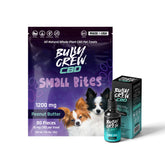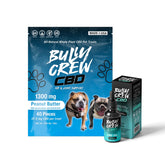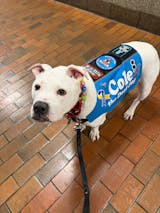If your dog is turning up their nose at dinner or only nibbling here and there, you're not alone. Just like humans, dogs can go through phases where they're not super excited about food, or they might just be naturally picky eaters. This is where an appetite stimulant for dogs may be helpful.
Feeding time shouldn't be a struggle. A healthy appetite is crucial for your dog's overall well-being, including energy levels, mood, and long-term health. And as someone who adores their pup, you want to ensure they're not just eating anything, but eating well.
This blog is here to help! We'll walk you through easy, realistic ways to encourage your dog to eat better, from finding the right appetite enhancer for dogs to small changes that make a big difference. Ready to turn your picky eater into a happy eater? Let's dig in!
Getting to Know Your Dog's Eating Style
Every dog is a little different when it comes to mealtime. Some dive right in and finish their bowl in seconds, while others like to nibble slowly throughout the day. That's why it's essential to understand what's normal for your pup—so if something seems off, you'll notice it right away.
A dog's appetite can also change depending on factors such as age, breed, activity level, and overall health. Puppies typically require more meals to support their rapid growth, whereas older dogs may slow down and eat less. By tuning into your dog's unique eating style, you'll be better equipped to spot any changes and confidently support their health.
How to Tell if Your Dog Has a Poor Appetite
If your dog isn't eating as much as they used to or seems uninterested in food, it might be a sign of a poor appetite. You may notice weight loss, low energy, or a lack of enthusiasm for their favorite treats. If this happens, it's a good idea to consult with your veterinarian.
What's Normal at Mealtime? Every Dog's a Little Different
Just like people, dogs have their own eating styles. Some like to graze throughout the day, while others wait for one big, satisfying meal. The key is setting a consistent routine that fits their rhythm—it helps keep their digestion on track and builds healthy habits.
Also, take note of how your pup eats. Do they gobble their food in seconds or take their sweet time? Fast eaters might need some help slowing down to avoid upset stomachs. The more you observe their quirks at mealtime, the better you can fine-tune their feeding routine to keep them happy and healthy.
Why Dogs Might Stop Eating or Eat Less
If your dog suddenly isn't interested in food, there's usually a reason behind it. Here are the three most common causes:
1. Health Problems
-
Illness, pain, or general discomfort can cause your dog to lose their appetite.
-
This includes anything from infections and dental issues to upset stomachs or chronic conditions.
-
If your dog skips more than a couple of meals or exhibits other symptoms, it's best to consult with your veterinarian.
2. Stress or Changes in Their Environment
-
Dogs are sensitive to their surroundings.
-
Loud noises, new people or pets in the home, moving to a new place, or even changes in routine can cause anxiety.
-
This stress can affect their eating habits.
3. Food-Related Issues
-
Sudden changes in their diet can turn them off from eating.
-
Some dogs don't like the taste or smell of a new brand or type of food.
-
As dogs age, their sense of smell and taste can weaken, making food less appealing.
-
Poor-quality food or spoiled meals can also be a big reason.
Appetite Stimulants For Dogs
Healthy Food Toppers
If your dog isn't eating well, offering gentle, tummy-friendly foods can help spark their appetite. One great option is bone broth—it's packed with nutrients and easy to digest, making it an ideal choice for dogs with upset stomachs. Try pouring some low-sodium beef, chicken, turkey, or pork broth over their food to make it more appealing.
You can also try adding plain Greek yogurt or pumpkin puree to their meals. Yogurt contains probiotics that support digestion, while unsweetened and additive-free pumpkin is not only tasty to many dogs but can also help regulate their appetite. These simple toppings can be great appetite enhancers for dogs, making mealtime more exciting and easier on their stomachs.
How CBD is a natural appetite enhancer for dogs
If your dog is losing appetite, CBD oil may be the best appetite booster for dogs to support their eating habits, especially when the cause is stress, anxiety, or physical discomfort. CBD interacts with the endocannabinoid system (ECS)—a complex system in your dog's body that helps regulate appetite, mood, pain, and overall balance. When the ECS is supported, dogs may feel more relaxed and comfortable, which can naturally encourage them to eat again.
Unlike some medications that can cause drowsiness or suppress energy levels, CBD is non-intoxicating and typically well-tolerated. It can help dogs feel calmer without sedating them, making it a gentle option for pets who may be refusing food due to stress, environmental changes, or chronic pain.
When considering CBD for your dog, always choose products made specifically for pets. These are formulated with appropriate dosages and don't include ingredients that are unsafe for animals, such as artificial flavorings or xylitol. Also, look for CBD products that are third-party tested for quality, safety, and purity. Consult your veterinarian before starting any new treatment, especially if your dog is on other medications or has existing health conditions.
The Role of Exercise in Stimulating Your Dog's Appetite
Regular physical activity is one of the easiest and one of the most natural dog appetite stimulants. Just like people, dogs often feel hungrier after burning off some energy. If your pup has been eating less than usual, a bit of extra exercise might do the trick.
Try adding an hour of walking to their daily routine or spending more time playing fetch or tug-of-war. As long as your dog isn't experiencing joint pain or health issues like arthritis or hip dysplasia, getting them up and moving can help kick-start their appetite in a healthy way.
If outdoor walks aren't possible or your dog has limited mobility, you can still encourage activity indoors. Games like hide-and-seek with treats, gentle indoor fetch, or even food puzzles can help get them moving and increase their interest in their next meal.
Create a Consistent Mealtime Schedule
One of the easiest ways to encourage your dog to eat better is by sticking to a regular feeding routine. When your dog knows exactly when to expect their meals, it helps their body develop a natural rhythm, and that anticipation can actually trigger their hunger.
If your dog is accustomed to grazing (having food available throughout the day) and suddenly loses interest in eating, switching to scheduled feeding times can make a significant difference. Try offering meals at the same time each day and picking up the bowl after 15–20 minutes, even if they don't eat. Over time, this helps your dog understand that food won't always be available, making them more likely to eat when it is offered. It's a simple shift, but it can really help rebuild a healthy mealtime habit.
Conclusion
Supporting your dog's appetite goes beyond just supplements—healthy food, regular exercise, and a stable routine are all key factors. CBD can help boost appetite by managing stress and discomfort, making mealtime easier for your dog. Paired with nutritious meals and daily exercise, CBD can be a natural appetite stimulant for dogs. As always, consult your vet before introducing new products to your dog's routine. With the proper care, your pup will be back to enjoying food and living a happy, healthy life.








